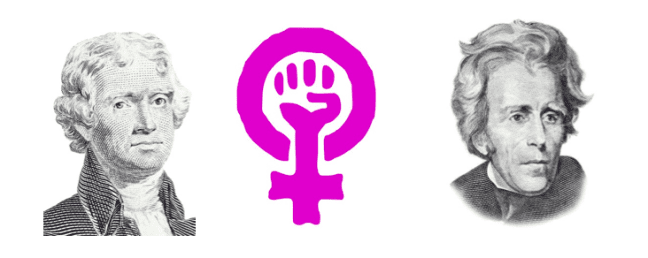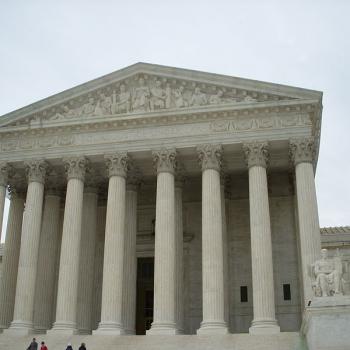 In many states across the country, annual Democratic Party fundraisers are promoted as Jefferson-Jackson dinners to honor the two men often credited as the founders of the Democratic party. A number of states are beginning to drop the Jefferson- Jackson link in the face of increasing interest in racial and gender inclusion.
In many states across the country, annual Democratic Party fundraisers are promoted as Jefferson-Jackson dinners to honor the two men often credited as the founders of the Democratic party. A number of states are beginning to drop the Jefferson- Jackson link in the face of increasing interest in racial and gender inclusion.
In the midst of a country where black lives appear expendable and some white people are unable to recognize that memorializing their ancestors should never be done in ways that celebrate the Confederacy and its’ mission of defending slavery – the question of how we handle our past is a question we have yet to effectively grapple with as a nation.
Jefferson’s revolutionary commitment to democratic equality established the foundation of our country’s independent spirit in the Declaration of Independence, in his words, “We hold these truths to be self-evident, that all men are created equal.” His writing was poetic and inspirational and his words have served to motivate and encourage generations of Americans to uphold and fight for the principles of freedom and equality as basic human rights.
The problem is, Jefferson owned more than 600 slaves. Not only was their labor and immiseration the foundation for his own tremendous wealth and social position, he carried on a long-term relationship with his slave Sally Hemings. While Hemings left no record of the relationship or her feelings about it, as his property she would have had no choice in the matter.
What do we do with the seemingly contradictory realities that Jefferson was committed to freedom and equality AND that he held slaves?
Of course, it wasn’t just slaves who were excluded from the Revolutionary ideals of freedom and equality. Women were not allowed to own property and were, in fact, treated in many ways as the property of their husbands under coverture laws that cast wives as subservient to their husbands.
And let’s not forget Andrew Jackson who is credited as the first Democratic President and one of the founders of the Democratic party. Not only did he own slaves, he helped usher the Indian Removal Act of 1830 through Congress and oversaw the removal of Native Americans from their lands via the brutal and genocidal Trail of Tears.
Were Jefferson and Jackson heroes or villains? It’s complicated.
History is complicated. Life is complicated.
As a woman, I have to live in a world whose history is overwhelmingly misogynist and patriarchal.
As a Christian woman, I was born into a religious tradition that has sanctified misogyny and institutionalized patriarchy.
As a Christian feminist, I have chosen to stay in my tradition despite this history. After all, given how deeply these problems are embedded in the history of the world, rejecting everything associated with misogyny and patriarchy isn’t really an option.
Christian feminism offers some insight into thinking about various ways to “deal with” oppressive histories.
Let’s start with the Bible.
I love the Bible.
Yes, it is full of violence against women. Yes, most of the female characters are denied voice or their stories are told for them. Yes, there are passages that have been interpreted in ways that have hurt women through the ages. Yes, there are some passages that are simply rude, demeaning to women, and in my estimation, simply wrong (I’m looking at you Paul and pseudo-Pauline writers!).
The Bible is also full of wisdom, and insight, and justice and compassion. It is a text that has shaped history and guided civilizations. It is a text of power and inspiration. I love to study it – on my own, in dialogue with other scholars, and in small groups of people committed to God and justice and to making the world a better place.
Is the Bible oppressive? It’s complicated.
I don’t find the Bible oppressive because I have learned how to study and interpret it in ways that are liberating rather than oppressive. We all interpret scripture. Even Biblical fundamentalists and literalists profess a particular interpretation of scripture, even if they think they don’t. Ignorance or denial of interpretation isn’t evidence of the contrary. Rather, it is evidence of a profound misunderstanding of how text functions, especially sacred texts.
My relationship to Jefferson and Jackson is much like my relationship with the Bible and many of the Church “fathers” who said some pretty horrible things and some pretty inspirational things. I study them in a similar way to how I study the Bible. I search their writings, their actions, and their lives for truths that I find meaningful, inspirational, insightful. I study them for what they might help me discover about justice in our own age. I also study them with my eyes wide open to the injustices that they actively caused and those in which they were complicit.
The problem with setting people up as “heroes” is that people are human and humans are flawed. It probably makes sense for states to rename their annual fund-raising dinners. But it doesn’t make sense to deny or reject Jefferson and Jackson completely. The question that we must continue to grapple with as we seek to shape a more free and equal society is how to live with and learn from our past instead of rejecting, rehabilitating, or glorifying it.












